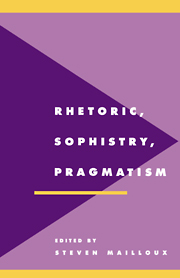Book contents
- Frontmatter
- Contents
- List of contributors
- Acknowledgements
- Introduction: sophistry and rhetorical pragmatism
- 1 Isocrates' philosophia and contemporary pragmatism
- 2 The degradation of rhetoric; or, dressing like a gentleman, speaking like a scholar
- 3 Antilogies, dialogics, and sophistic social psychology: Michael Billig's reinvention of Bakhtin from Protagorean rhetoric
- 4 The “genealogies” of pragmatism
- 5 Philosophy in the “new” rhetoric, rhetoric in the “new” philosophy
- 6 Individual feeling and universal validity
- 7 Pragmatism, rhetoric, and The American Scene
- 8 The political consequences of pragmatism; or, cultural pragmatics for a cybernetic revolution
- 9 In excess: radical extensions of neopragmatism
- Selected bibliographies
- Index
7 - Pragmatism, rhetoric, and The American Scene
Published online by Cambridge University Press: 03 December 2009
- Frontmatter
- Contents
- List of contributors
- Acknowledgements
- Introduction: sophistry and rhetorical pragmatism
- 1 Isocrates' philosophia and contemporary pragmatism
- 2 The degradation of rhetoric; or, dressing like a gentleman, speaking like a scholar
- 3 Antilogies, dialogics, and sophistic social psychology: Michael Billig's reinvention of Bakhtin from Protagorean rhetoric
- 4 The “genealogies” of pragmatism
- 5 Philosophy in the “new” rhetoric, rhetoric in the “new” philosophy
- 6 Individual feeling and universal validity
- 7 Pragmatism, rhetoric, and The American Scene
- 8 The political consequences of pragmatism; or, cultural pragmatics for a cybernetic revolution
- 9 In excess: radical extensions of neopragmatism
- Selected bibliographies
- Index
Summary
Though William and Henry James have come in for their fair share of comparison, such comparisons have paid surprisingly little attention to the specific philosophical and methodological connections between William's pragmatism and Henry's critical theory and practice. There are no doubt various explanations for this, ranging from the tendency still prevalent in some circles to see Henry and William as intellectual as well as temperamental opposites, to the belief that pragmatism has always remained too crude a philosophical instrument to be entertained by a mind as aesthetically refined as Henry's. Such prejudices can be maintained, however, only at the expense of suppressing the admission, wrung from a surprised but elated Henry upon the completion of William's book on pragmatism, that in fact he himself, as he could now see, had always been a lifelong pragmatist. After finishing William's A Pluralistic Universe, Henry was even more emphatic in a letter to his brother:
It may sustain and inspire you a little to know that I'm with you, all along the line – and can conceive of no sense in any philosophy that is not yours! As an artist and a “creator” I can catch on, hold on, to pragmatism and can work in the light of it and apply it; finding, in comparison, everything else (so far as I know the same!) utterly irrelevant and useless – vainly and coldly parallel.
Such confessions might count for less if there was not such an abundance of textual evidence to support them.
- Type
- Chapter
- Information
- Rhetoric, Sophistry, Pragmatism , pp. 155 - 179Publisher: Cambridge University PressPrint publication year: 1995



